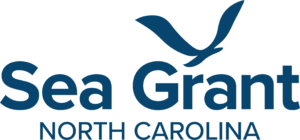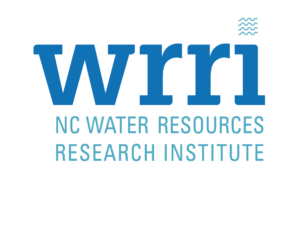Community Collaborative Research Projects
The Community Collaborative Research Grant Program, or CCRG, is an innovative funding opportunity that requires research approaches that couple local knowledge with scientific expertise. The CCRG is supported by WRRI and North Carolina Sea Grant, in partnership with the William R. Kenan Jr. Institute for Engineering, Technology and Science (KIETS).
Explore Funded CCRG Projects
The table below contains a list of funded CCRG projects dating back to 2018. Use the search bar to search particular topics, researchers, or key words. If a final report is available, it has been provided as a hyperlink within the title column. For a list of projects funded prior to 2018, contact John Fear (jmfear@ncsu.edu).
| Title | Scientific Lead | Local Knowledge Expert | Year Started | Key Terms | In the News |
|---|---|---|---|---|---|
| Recognizing African American Participation in the North Carolina Seafood Industry | Barbara Garrity-Blake, Duke University Marine Lab | John Mallette, Southern Breeze Seafood | 2023 | diversity; story-telling; fisheries; seafood | from NC Catch |
| Embracing ways to engage research in the Walnut Creek Watershed | Angela Allen, NC State University | Samantha Krop, Sound Rivers | 2023 | community engagement; water quality; environmental justice | from Sound Rivers |
| Connecting citizen science and youth action within local coastal communities to decrease plastic in our stormwater and advocate for clean water | Liz DeMattia, Duke University Marine Lab | Lisa Rider, Coastal Carolina Riverwatch | 2023 | stormwater; plastic pollution; youth engagement; citizen science | from NC WRRI |
| Spatiotemporal patterns of algal toxin contamination in small and juvenile fish across Albemarle Sound and its tributaries | Astrid Schnetzer, NC State University | Carlton Godwin, NCDEQ Marine Fisheries Division | 2023 | fisheries; toxic algal blooms; HABs; water quality | from NC WRRI |
| Understanding Plastic Contaminants in Western N.C. Headwaters | Jerry Miller, Western Carolina University | Eric Romaniszyn, Haywood Waterways Association | 2022 | plastic pollution; youth engagement; atmospheric deposition | from Spectrum News |
| Building Agents of Change in Mecklenburg County through Youth Education, Career Awareness, and Citizen Science | Olya Keen, UNC Charlotte | Ebone Lockett, Harvesting Humanity, LLC | 2022 | youth engagement | from NC Sea Grant |
| Reinforcing Resilience: Gleaning Knowledge from the Land and Water of the Waccamaw Siouan Tribe | Eric Britt Moore, UNC Wilmington | Ashley Patrick Lomboy, Waccamaw Siouan STEM Studio | 2022 | indigenous engagement; environmental justice | from WHQR's CoastLine |
| HAPs and HABs: Investigating Associations between air and water quality through community collaborations in eastern North Carolina | Hans Paerl, UNC Chapel Hill Institute of Marine Sciences | Colleen Karl, Chowan-Edenton Environmental Group | 2022 | algal blooms; HABs; air quality; water quality | from NC Sea Grant's Coastwatch |
| Using adaptive management to guide the next phase of the New River Estuary Oyster Highway | Joel Fodrie, UNC Chapel Hill | Pat Donovan-Brandenburg, City of Jacksonville | 2021 | oyster restoration | from CoastalReview |
| Building coastal resilience through youth-led community conversations | Kathryn Stevenson, NC State University | Vequainn Joyner, Boys and Girls Club of the Coastal Plain | 2021 | youth engagement; coastal hazards; resilience | from NC Sea Grant |
| Determining contaminant accumulation and exposures in local shark species from domestic fisheries | Scott Belcher, NC State University | Captain Charles Locket, F/V Salvation | 2021 | human health; food web; contaminants; PFAS; Persistent Organic Pollutants (POPs) | from NC Sea Grant |
| Hybrid Constructed Wetlands to Further Reduce Nitrogen and Phosphorus Loads from Municipal Wastewater Treatment Plants | Natasha Bell, East Carolina University | Jason Manning, Greenville Utilities Commission | 2021 | wastewater; wetlands | from ECU News |
| Science and Data Support for the Town of Nags Head Estuarine Shoreline Management Plan | Reide Corbett, East Carolina University | Holly White, Town of Nags Head | 2021 | coastal erosion | |
| Increasing environmental literacy of North Carolina freshwater mussel conservation through a projection mapping exhibit | Lindsey Zarecky, Greensboro Science Center | Rachel Hoch, NC Wildlife Resources Commission | 2021 | public engagement; environmental literacy; freshwater ecosystems | from NC WRRI |
| Determining the ecological impacts of shellfish relay in North Carolina | Joel Fodrie, UNC Chapel Hill | Stevenson Weeks, Crab Point Seafood | 2020 | oyster relay; estuarine ecology | from NC Sea Grant's Coastwatch |
| Testing Novel Substrates and Approaches to Improve Oyster and Salt Marsh Restoration | Rachel Gittman, East Carolina University | Brandon Puckett, NC National Estuarine Research Reserve | 2020 | oyster reef restoration; shoreline erosion | from NC Sea Grant |
| Speak Your Piece: Coastal Youth, Environment and Community | Rose Hoban, North Carolina Health News | Nick Szuberla, Coastal Youth Media | 2020 | youth engagement; climate change; science communication | from NC Sea Grant's Coastwatch |
| Detritus removal and enhanced aeration to improve water quality treatment and extend the useful life of constructed wetlands in NC | Michael Burchell, NC State University | Fred Summers, North Carolina Rural Water Association | 2019 | wetlands; water quality | from NC Sea Grant's Coastwatch |
| Connecting for resilience: understanding community networks and their role in disaster preparedness and response | Lisa M. Campbell, Duke University Marine Lab | Karen Amspacher, Core Sound Waterfowl Museum and Heritage Center | 2019 | natural disaster; hurricane response; community resilience | from NC Sea Grant's Coastwatch |
| In the Wake of the Storms: Working Waterfronts and Access in Coastal North Carolina | Barbara Garrity-Blake, Duke University Marine Lab | Susan West | 2019 | seafood industry; coastal economies | from NC Sea Grant's Coastwatch |
| Using citizen science to understand nutrient limitation of algal blooms on the Chowan River: Filling critical data gaps and promoting community engagement | Nathan Hall, UNC Institute of Marine Sciences | Colleen Karl, Chowan Edenton Environmental Group | 2019 | HABs; cyanobacteria; citizen science | from NC Sea Grant's Coastwatch |
| Food Web Transfer of Cyanobacterial Toxins in the Chowan River and western Albemarle Sound, North Carolina | Astrid Schnetzer, NC State University | Charlton Godwin, NC Department of Environmental Quality Fisheries Management | 2019 | HABs; cyanobacteria; fisheries | from NC Sea Grant's Coastwatch |
| Assessment of Novel and Legacy Poly and Perfluorinated Alkyl Substances (PFASs) in Alligator and Fish of the Cape Fear River | Scott Belcher, NC State University | Madi Polera, Cape Fear River Watch | 2018 | PFAS; alligator; Cape Fear River; bioaccumulation; public health | from WHQR |
| Assessment of Flood Risk and Simulations of Wetland Change in Pender County, North Carolina | Joanne Halls, UNC Wilmington | Wesley Macleod, Cape Fear Council of Governments | 2018 | urban development; GIS; coastal flooding; wetlands | from Star News |
| Night-Scape Resources of a Sustainable Eco-Tourism Trail System on the Outer Albemarle Peninsula (OAP): Tyrrell, Washington, & Mainland Hyde-Dare Counties, NC | Stanley Riggs, NC Land of Water (NC LOW); Brian Baker, A Time For Science (ATFS) | Karen Clough, NC Land of Water (NC LOW); Emily Jarvis, A Time For Science (ATFS) | 2018 | light pollution; public engagement; K-12 education | from NC Sea Grant's Coastwatch |


